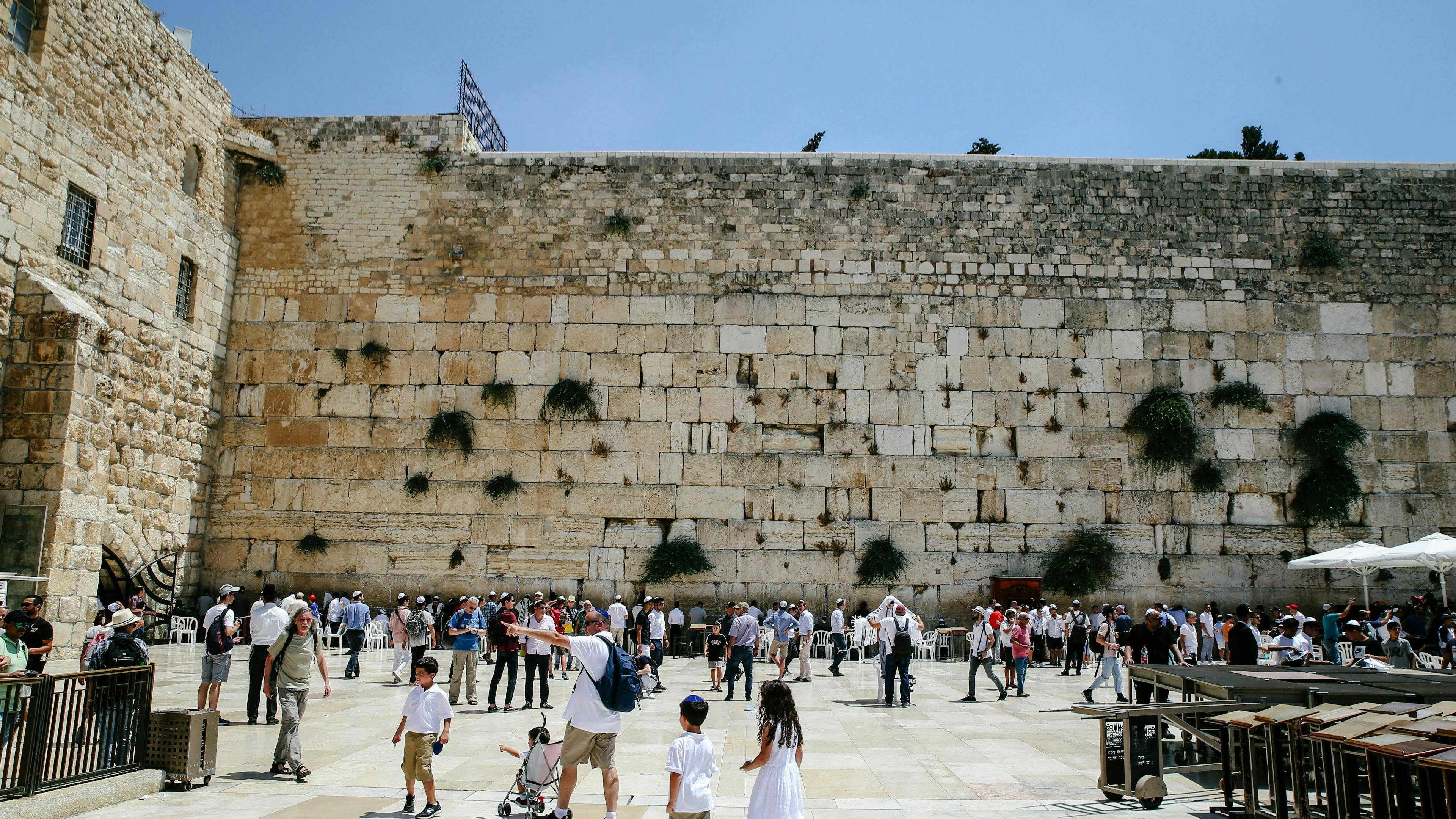Messiah is mentioned by name in the ninth chapter of Daniel. A great deal is mentioned about what he will do and we all want to know more about what that means. “Seventy weeks”, the L-d declares to the prophet Daniel, “are determined upon thy people and upon thy holy city, to finish the transgression, and to make an end of sins, and to make reconciliation for iniquity, and to bring in everlasting righteousness, and to seal up the vision and prophecy, and to anoint the most Holy. (Da. 9:24)”. Yet while it is very clear it is talking about Messiah, it leaves us asking many questions. If we have patience and take care, however, we can find answers.
What are the seventy weeks?
When the prophet mentions the word ‘weeks’, we can take these for ‘weeks’ of years, or periods of seven years. Daniel’s contemporary Ezekiel had lain on his side for 390 days, and then 40 days - “each day for a year” (Ezekiel 4:6). A week of years, then, would be seven years, and seventy weeks would be 70x7: 490 years.
We know that this prophecy is about the Messiah, as Daniel 9:26 says that after a certain time “Messiah shall be cut off”. The time mentioned is seven and sixty-two weeks, or collectively, 69x7, i.e. 483 years. The time period begins with King Cyrus’ decree to rebuild Jerusalem and restore its temple (Da. 9:24; also Ezra 1:1-2), and ends with Messiah being
We are also told that this cutting off of the Messiah also brings sin to an end, brings reconciliation for iniquity, and brings in everlasting righteousness.
While there may be different opinions about the precise timing of the seventy weeks, everyone can agree that this is a prophecy of Messiah himself. If we consider the seventy weeks to begin properly, not with the decree of Cyrus to rebuild the city of Jerusalem (thought to have occurred around 538 BC), but rather, the decree of Artaxerxes to rebuild the temple of Jerusalem in the middle of the 5th century BC, we can see how the 70 weeks (or 490 years) lead us into the time of Jesus Christ, whose death is around 33 AD. The Rabbis, especially Rashi, place the ending of the seventy weeks only a few decades later which shows that the general timeframe of the seventy weeks is agreed.
Did Rashi get it right?
Over the centuries rabbis have not quite known what to do with Daniel 9:24-27. It so clearly sets out the precise timing of Messiah’s coming. But the fact that the 490 years have come and gone is a problem. Most Jews are still waiting for the Messiah, but this passage says he has already come. The famed Rabbi Rashi, whose opinions many Jews study alongside Scripture itself, claims that the Messiah or "anointed one" really refers to Agrippa II. He was the king of Judaea in AD 70 when the Romans came to destroy Jerusalem. Interestingly, Rashi places the closing of the seventy weeks at a similar time to Christian writers. Yet the cutting off of Agrippa did nothing to make an end of sins or establish righteousness. So how can Rashi be right about this?
Rashi claims that sin is ended in this manner: “so that Israel should receive their complete retribution in the exile of Titus and his subjugation, in order that their transgressions should terminate, their sins should end, and their iniquities should be expiated, in order to bring upon them eternal righteousness and to anoint upon them (sic) the Holy of Holies: the Ark, the altars, and the holy vessels, which they will bring to them through the king Messiah.”
But for all the troubles of the Jewish nation after Titus, there was no end to their sins. Clearly, the Jews, as every other nation on earth, have continued sinning. Murderers, thieves, and liars abound in Israel just as they do in all other countries of the world. So how can he be right?
It seems that Rashi is saying that the exile Titus imposed after the destruction of Jerusalem is a complete retribution or punishment for their sin. Yet this exile will be ongoing until there is a temple and Messiah. Therefore, their sin has not been ended or fully taken away, it is an ongoing process. It happened in order that their sin should end and be expiated when the temple is restored with Messiah coming at a future time. However, the passage does not say that at all. The passage says that after 490 years, sin will be brought to an end - not that a process of ending sin will begin. The forgiveness from sin was only achieved through the death of the Messiah. Jesus’ death is the legal basis for the forgiveness of all his people. Without the Messiah having been cut off, we would have no reason to hope for G-d’s forgiveness.
How does the cut-off Messiah bring an end to sins?
But the obvious question arises: how could sin be brought to an end 2000 years ago, if Israel still sins today? The answer is that Jesus the Messiah brought an end to sin judicially on the cross, by dying in the place of all sinners who trust in him alone. G-d works in the heart of his people so that they see their sins, despair of themselves, and lean wholly on the mercy of G-d, as presented in the gospel of Messiah Jesus. As these sinners are aware of their sinful nature and trust in Christ, they are said to have true faith - and the just shall live by faith (Habakkuk 2:4). G-d then declares us righteous. Our sins are placed on Jesus’ shoulders, and we are clothed with his righteousness. As the prophet of Israel, Isaiah, says of Messiah,
(Isaiah 53:11)
“by his knowledge shall my righteous servant justify many; for he shall bear their iniquities”
What is a judicial end to sin? It is when G-d takes hold of unholy sinners, whose hearts are desperately wicked (Jeremiah 17:9), and whose hearts never produce one truly good thought or deed (Genesis 6:5), and causes them to see their wickedness and seek after G-d. As G-d is holy, and is of purer eyes than to look on evil (Habakkuk 1:13), he cannot accept sinners in their sins, without an atonement. The Messiah is the mediator, who bears the sins of his people - and is “bruised for our iniquities” (Isaiah 53:4). G-d causes his people to believe in his Son the Messiah, and from that point onwards, they have forgiveness of sins in Christ, and are declared by G-d in his judgment to be righteous. This is the blessedness that David speaks of in Psalm 32, when he says: “Blessed is he whose transgression is forgiven, whose sin is covered. Blessed is the man unto whom the L-d imputeth not iniquity, and in whose spirit there is no guile.” The Rabbis cannot offer this blessed hope. Instead, those who seek salvation by religious observances are plagued with accusations from their own conscience that brings their sins to mind. They cannot have peace since they cannot obey G-d in their own strength.
Righteousness is not a process of man, but a declaration by G-d for those redeemed through Messiah’s death
It is time to cast aside empty hopes placed in our own righteousness in religion. As Isaiah says, “But we are all as an unclean thing, and all our righteousnesses are as filthy rags; and we all do fade as a leaf; and our iniquities, like the wind, have taken us away.” Isaiah 64:6
Paul, a learned Jew who became an apostle teaches us the true alternative:
2 Corinthians 5:21
“For he hath made him to be sin for us, who knew no sin; that we might be made the righteousness of G-d in him”
In a very real sense, when we trust in him, our sins were borne by the Messiah on the cross, while his perfect obedience to the Law of G-d is imputed to us as our righteousness too. This is not because we somehow “earn” or merit Christ’s righteousness through our faith or knowledge. Rather, G-d graciously chooses to bless us with this gift of salvation, and he does so by sending his Holy Spirit to cause us to repent of our sins and turn away from them, trusting in G-d’s Son the Messiah.
The prophet Daniel surely has this glorious and heavenly transaction in mind when speaking of the cut-off Messiah putting an end to sin, and bringing in everlasting righteousness.
Rashi presents the cutting off of sin, and bringing in of righteousness, as a process that spans the future history of Israel, from Agrippa onwards. In the same vein, the rabbis teach that righteousness is achieved through a lifelong process. Yet this is not how righteousness is achieved, as G-d achieved the redemption of his people through Christ’s death on the cross. He then applies that redemption to each elect person when they are regenerated by the Holy Spirit and come to faith individually. So we do not need to labor for centuries in a process to bring in righteousness, when Messiah has already brought in righteousness 2000 years ago!
Jesus the Messiah was cut off, just as Daniel prophesied, but not for himself (Daniel 9:26). He was crucified and put to death, as the rejected cornerstone of Israel (Psalm 118:22). He was not seeking his own riches, but rather, the glory of G-d. “I delight to do thy will, O my G-d: yea, thy law is within my heart” (Psalm 40:8).
It’s true that Daniel 9:24-27 refers to the coming of the Romans in AD 70 to destroy Jerusalem; however, this occurs after Messiah’s cutting off which brought an end to sin. The destruction of Jerusalem signifies that we are no longer in need of a material temple or the blood of bulls and goats, which cannot take away sins (Hebrews 10:4).
What the death and resurrection of Messiah means for you
All this is not mere abstract speculation, but is true and deeply spiritual. While rabbis have tried in vain to explain away Daniel 9:24-27, you need to accept its actual meaning - regardless of what other Jews may say or think about you for doing so.
If you are weighed down by the burden of your sins, and seeking to repent of them, you can put your trust in Jesus the Messiah, who will put your sins away if you truly repent and believe. For he says,
Matthew 11:29-30
“Come unto me, all ye that labour and are heavy laden, and I will give you rest. Take my yoke upon you, and learn of me; for I am meek and lowly in heart: and ye shall find rest unto your souls”
We know that the Messiah did not stay dead, he was raised to life on the third day. He is also able to raise us to spiritual life from the dead condition we are in without him. He will raise our bodies to eternal life too, if we trust in him.
And if your sins are forgiven in the Messiah, then you yourself will possess an everlasting righteousness given to you by Jesus - something that you can never earn yourself before G-d, as you are wholly sinful and corrupt by nature.
More Topics
You might alsoo be interested in these topics.




